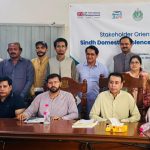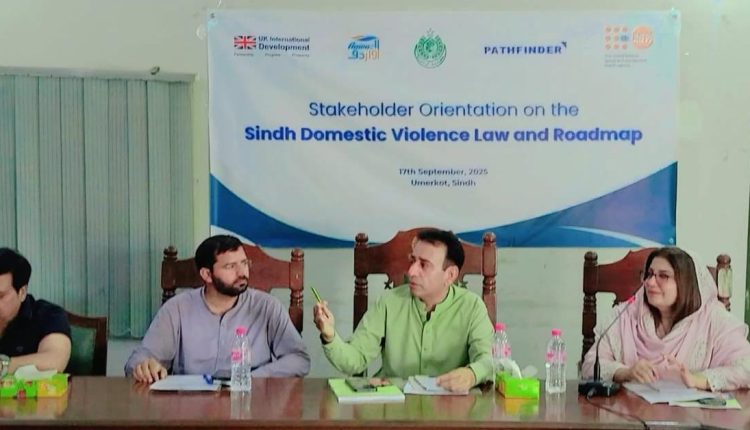Stakeholders in Umerkot Discuss Strengthening Sindh’s Domestic Violence Law
Stakeholder session was held to brief key government officials and gender-based violence (GBV) service providers on Sindh’s Domestic Violence Law and its implementation roadmap
A divisional stakeholder session was held in Umerkot to brief key government officials and gender-based violence (GBV) service providers on Sindh’s Domestic Violence Law and its implementation roadmap.

The session brought together representatives from safe houses, Dar-ul-Amans, Child Protection Units, health departments, police, and prosecution services to clarify roles, responsibilities, and support systems for effective enforcement.
Advocate Rubina Brohi, Policy and Advocacy Manager at Pathfinder International, welcomed participants and outlined the multi-sectoral coordination committee chaired by the Sindh Chief Secretary, with representation from the Home, Women Development, Law, and Health departments. She also highlighted the work of the One Stop Protection Center (OSPC) in Hyderabad and reminded participants that Sindh became the first province to pass a domestic violence law in 2013. However, she noted that gaps in clarity, coordination, and resources have limited its impact.
Barrister Rida Tahir presented recommendations for legal amendments to strengthen the Act. The Women Development Department (WDD), with support from UNFPA, the FCDO AWAZ II Program, and Pathfinder International, is leading efforts to make the law more actionable and survivor-centered. These efforts also include advocating for greater resource allocation and stronger institutional mechanisms.
Additional Deputy Commissioner-I Umerkot, Javed Dahiri, praised the initiative and assured full administrative support. Other speakers included Zulfiqar Abbasi from Sindh Police, Ms. Tehmina Rehman, Ms. Farida Tahir, and Ms. Nazia Farrukh.
The Umerkot session is part of a province-wide effort to equip frontline actors—from shelter staff to law enforcement with the knowledge and tools needed to protect survivors and ensure justice.

